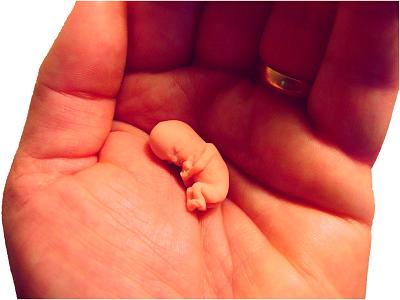… Includes Extensive Discussion on the “Hard Case” of Pregnancy by Rape

Sogn Mill-Scout’s words will be in blue. He is a Christian. I have edited and shortened the original exchange by about one-third. It was originally 18,700+ words. Sogn actually changed his opinion, away from “pro-choice” (about halfway through the dialogue), to pro-life with exceptions for rape and other “hard cases” only. It is possible; many have done so. But it’s rare that they concede the basic point right during a dialogue.
*****
I’m not a Catholic . . . I am, however, a Christian (Episcopal) who worships and tries to follow Christ. Nevertheless, I disagree with your view on voting vis-a-vis Christian belief. While I disapprove of abortion in the vast majority of cases, I’m also pro-choice in the sense that I don’t believe all abortions should be outlawed
Which should be allowed, and why?
(this emphatically does not imply that I subscribe to the views of, say, NARAL or NOW on this subject). There are at least two reasons for my position, which I don’t have any problem reconciling with my Christian faith. First, we live in a pluralistic democratic republic, not a Christian theocracy.
So what? What does that have to do with what is right and wrong, pray tell?
Simple. I will conveniently quote from Kurt’s recent post:
St Thomas Aquinas provides a useful response to this question: ‘Now human law is framed for a number of human beings, the majority of whom are not perfect in virtue. Wherefore human laws do not forbid all vices, from which the virtuous abstain, but only the more grievous vices, from which it is possible for the majority to abstain; and chiefly those that are to the hurt of others, without the prohibition of which human society could not be maintained: thus human law prohibits murder, theft and such like.’ (Summa Theologica, I-II, 96, 2)
So the law of the state need not outlaw every immoral act but should outlaw those immoral acts which cause serious harm to others. …
Exactly. Abortion causes serious harm to others, because it rips preborn babies from limb to limb, tortures them, and murders them, thus depriving them of ever setting foot on the earth. This helps your case not a whit, because you still have to establish that persons are not being slaughtered. Secondly, it is easy to show how abortion seriously harms women, so even if persons weren’t being murdered, legal abortion would fail Thomas’s test.
A Christian theocracy would outlaw all vices, as they are defined by the Christian moral code (interpreted, of course, by some organized body of Christians, whether the Catholic church, Evangelicals and Catholics Together, Reformed Reconstructionists, or whoever seized power).
I’m not talking about that (nor do I see any pro-lifer doing so). The only point I made was that contraception was, in fact, widely illegal as recently as JFK’s presidency, and we were not an “Islamic fundamentalist” Republic. We were just barely Christian then, as a society (if at all). I’m talking about systematic, institutionalized murder and slaughter. You need to work through your position as to what constitutes a person and a human being in other than vague terms.
The constitutional republic of the United States, on the other hand, cannot legally mandate the moral code of Christianity or any other religion. It must instead reflect the (hopefully) reasoned consensus of its citizens.
All laws impose themselves on those who disagree. A majority favoring them is not necessary. We elect representatives, and if they pass a law that we don’t like, we are bound to it unless it is changed by future representatives.
There is no settled moral consensus that abortion is intrinsically wrong.
So what? What do you do: determine your morality and ethics by counting heads? What if 99.9% of the American populace thought child molestation, rape, and partial-birth “abortion” [i.e., infanticide] were “right”? Would you then adopt those positions?
This is a moot point since no such ‘society’ could endure (cf. C S Lewis’s Abolition of Man and its concept of the Tao, or universal natural law).
That’s beside the point. I exaggerated in order to illustrate a moral / philosophical principle, which you need to deal with.
However, I imagine that somewhat higher percentages of people could come to believe some particularly abhorrent practice is morally acceptable. Most Americans accepted slavery for quite a while, and racial prejudice remained rampant for many decades after slaver ended. But all this is irrelevant as I’m not claiming that morality is determined by majority vote.
Then why do you keep arguing that there is no consensus on abortion today, as if that has any relevance to its rightness or wrongness?
I believe in moral principles ordained by our Creator. But I also place a high value on preserving the integrity and stability of our civilization, even if it is not distinctively colored by Christian moral principles.
Killing children legally does this?!
As I indicated earlier, I would go even further than pro-lifers in some respects, in that I would like to protect all sentient beings, not just human fetuses.
This is the downfall of your case, as I have already started to argue (also in our debate on vegetarianism). You’ve done all my work of arguing for me, and have made it easy for me to succeed in this dispute. Most abortions occur with sentient preborn babies, depending on definition. The early abortions probably don’t inflict pain on the victims (dear God, I sure hope they don’t), but they are sentient, if by that you mean brain waves (which are present at six weeks). If you equate brain waves with sentience and sentience with personhood, then you couldn’t possibly favor legal abortion in the US. You yourself admitted sentience for a 12-week-old fetus. This is first trimester, and legal with no limitation whatsoever.
Violence isn’t wrong only when its victims are human.
I agree with you there. I am against all cruelty to animals, as you are.
I believe I’m right and the vast majority of humans are wrong on that point. But does that give me the right to dictate my belief in the form of law? No.
Good. Then quit talking about consensus and diversity and simply fight for what you believe, on a philosophical, legal, and legislative level. Everyone else does so: Christian and non-Christian alike. It is only this fake tolerance which amounts to absurd libertarian-compromised positions. One could oppose slavery when it was perfectly constitutional and upheld by the Supreme Court. One can oppose abortion today as well. No difference. “Diversity” of opinion makes not one whit of difference.
And even if I could pass such laws it would do no good since most people hold diametrically opposed beliefs and would defy the laws.
Laws have the effect of discouraging behavior (as well as encouraging it, when it allows something). I strongly disagree with this. Laws against racial discrimination have had a positive effect on behavior. Racism is arguably, considerably less than it was — at least outwardly.
The same is true of abortion. Many abortions occurred during the decades when it was illegal.
That has no bearing on the ethical argument. And the figures were grossly exaggerated. They were saying “thousands” of such abortions occurred. This is not true. People like Bernard Nathanson (former abortionist in the forefront of the “pro-choice” movement) report how the pro-aborts deliberately lied and distorted known facts in order to get their agenda through.
. . . a large segment of our society does not believe that a nonsentient human embryo, much less a zygote, has the right to life inherent in personhood.
That has no bearing on whether a person in fact begins at conception.
I didn’t say it did. But unless you can persuade most people to view zygotes as persons, passing your laws will only lead to further social combustion.
Better social combustion than wholesale murder. I think you have your priorities backwards. Murder must be stopped, if it is determined to be murder, no matter what the cost.
. . . Given such a profound division in moral perspective, I don’t see how one can justify imposing the view of some (not all) Christians on the rest of society.
All laws impose their views on the rest of society. So what? What do we do: refuse to make law on anything where people disagree? What would become of income tax or 30 mph speed limits on big streets, etc.?
I’m saying you don’t have the right to impose this particular law (against all abortions) any more than I have the right to impose a law against exploitation of animals.
You have a “right” to do so (in a legal sense) insofar as you utilize the usual legislative channels and pass the law. Then people would be bound to it. All law compels some against their will. If it is many, in the case of murder or slavery, then so be it.
It doesn’t follow simply from the fact of disagreement, but from the fact that ours is a society comprised of diverse and all-encompassing philosophies and religions.
That is ethically irrelevant. Abortion was formerly almost universally condemned by pagan and Christian alike (as were even divorce and contraception). This is not a specifically Christian issue. It is a human rights issue, and a very fundamental one at that. If the consensus used to be pro-life, it could conceivably be so again. But we don’t accomplish that by sitting on our butts. If the abolitionists had taken that stance, slavery might still be here today. All great social movements and Christian movements have to buck the trend: whether it was the abolition of child labor, or the establishment of labor unions, or the civil rights movement. This is self-evident. What is so hard to comprehend here? Christians are always idealists. We don’t accept things as they are, but work towards things as they should be. That applies to law just as to every other aspect of life.
Your task is to explain to me (and us) why you believe a person does not begin to exist at conception. I’ve never heard a cogent case for this presented in the 22 years I have been pro-life. If you can’t make the case, then your position is groundless and entirely arbitrary, and based on relativism (counting heads).
I don’t equate personhood with DNA.
Why? A statement is not an argument. I’m trying to find out and understand why you believe as you do, not just what you believe.
I think there are certain necessary conditions of personhood, most notably sentience, or at least the property of having been sentient at some point in one’s existence.
Why?
Why would you equate personhood with having 46 human chromosomes?
It’s the principle of organic development (explained elsewhere in this discussion).
‘Personhood’ is roughly synonymous with ‘selfhood’, as reflected in one of the relevant dictionary definitions: “the personality of a human being: SELF.” An organism consisting of a few cells is not in any plausible sense of the word a self, even if it possesses human DNA.
Again, it goes back to development. But your argument falters even if we grant this, based on sentience and deprivation of potential persons, which is practically as evil and unjust as deprivation of actual persons.
. . . If you know, on the other hand, that a person begins at conception, then you must favor laws that protect those persons, just as we have laws against murder of born persons. Birth is not all that significant in the life history of a human being.
I never focused on birth. I specifically rejected partial birth abortion as an abomination, and I identified sentience as the key element in identifying subjects toward which we have duties.
Good. Now you have to explain to us when a person is a person and when they should be protected, or else your position reduces to my analogy of two hunters shooting into the woods and not caring if people are in there or not, because their “right to hunt” overrides potential harm to persons. All that changes (after birth) is how the baby breathes and receives nutrition. No big deal.
I agree. Infanticide is murder. Killing a sentient fetus likewise immoral.
Good. I’m building my argument on your own assumptions (as the good socratic that I am). People receiving food from IV’s are similar to preborn babies. People in lung machines or with ventilators are, too. They breathe in a different way from the normal process. The really important, exponentially more crucial stuff occurred long before: the heart started beating at 18 days; brain waves at about 6 weeks (both of which are how we generally determine where death has occurred).
Assuming you’re correct with the six-week figure (I can’t recall, but I thought it was later), there is almost certainly no sentience present prior to that point, i.e. prior to the emergence of a functional neurological system.
“Brain waves have been recorded at 40 days on the Electroencephalogram (EEG). H. Hamlin, “Life or Death by EEG,” JAMA, Oct. 12, 1964, p. 120
“Brain function, as measured on the Electroencephalogram, “appears to be reliably present in the fetus at about eight weeks gestation,” or six weeks after conception. J. Goldenring, “Development of the Fetal Brain,” New England Jour. of Med., Aug. 26, 1982, p. 564
In an article cited by a pro-abortion web page (“Fetal Awareness,”), it was stated that pain may be felt by a preborn child as early as 22 weeks after gestation.
All the DNA a person will ever need for the rest of their life: literally what makes them the distinct person they are, is present from the moment of conception. If the baby is a male, then he is obviously not a part of his mother’s body, for that would mean that she has a penis. Etc., etc. This is all rather self-evident and unarguable. It’s medical fact.
What is special about DNA? It’s merely information in chemical form. It has no more moral significance than software.
It is the stuff which makes it possible for the fetus to develop into an adult human being. It’s the “blueprint,” in a sense (but much more than that, as a blueprint doesn’t develop into a building, like DNA develops into an adult person). All that is added is time and nutrition. Therefore, the person is present from the beginning, because there is no logical or non-arbitrary way to begin “personhood” at any other time. If I trace myself back in time, I go back continuously to the moment of my conception. Before that, it is nonsensical to talk about me. I didn’t yet exist. After that, it is nonsensical to pick some point at which I began as a person. There is no reason why “human” should be distinguished from “person” in the first place.
. . . To use a parallel example, as a vegetarian I’d love to ban the torture and killing of animals,
That’s interesting. So you place animals higher in the scheme of things than human beings.
I can’t see anywhere I said or implied that.
Then you will have to be against the killing of preborn babies as soon as they are sentient (since that is your criteria, but you have yet to explain why).
The parallel consists solely in the idea of imposing one particular religious conviction upon huge numbers of fellow citizens who don’t share that religious belief.
The fetus at 19 days isn’t human even though it has all its DNA in place and has a beating heart?
I didn’t say it isn’t human; being a specifically human organism is nothing more than having human DNA. My claim is that having human DNA is not a sufficient condition of being a person. Sentience is a minimal necessary condition.
On what grounds and what authority do you make this distinction between a person and a human? But you would be against the abortion of a preborn dog or porcupine? Is that what you think? Why? Make your case.
I didn’t condemn the abortion of animals. I condemn the killing and/or torment of sentient beings in general, human or nonhuman, barring countervailing factors (e.g., self-defense, or perhaps a just war, though I’m not quite decided about whether there is such a thing).
Okay, but I want to know why you select sentience as defining of a person rather than the possession of a soul?
. . . but I don’t believe in dictatorship, no matter how it may cloak itself in pretensions to divine infallibility.
It has nothing directly to do with “divine infallibility” — it is medical and scientific fact and logical consistency applied to ethics. The inalienable right to life is presupposed in our Declaration of Independence. Jefferson didn’t even feel he had to argue it. It was “self-evident.”
The reality of an inalienable right to life isn’t in dispute.
Then why do you advocate abortion at all? As I already argued, even if the slaughter and child-killing (aka abortion) occurs before you think a person is present, you have, nevertheless deprived this “non-person” human of the life it would inevitably come to possess, but for the butcher coming in to tear him or her limb from limb and destroy him or her.
Jefferson felt that the first function of government was to protect life. What does that have to do with “divine infallibility”? Please tell me; I’m dying to know.
You’re presuming to impose your concept of personhood (where possession of human DNA is a sufficient condition) upon a society many of whose members reject that concept.
Why do they reject it? It is irrelevant how many people believe what, in terms of moral legislation — I already discussed that, and you seemed to agree.
Without appeal to God as being on your side, your position would be utterly capricious.
I haven’t brought God or the Bible into this at all, except passing mentions of the soul, which I did only because I know you are a Christian and presumably accept that belief. This case doesn’t rest on Christianity or even God in a theistic sense, but on elementary ethics (e.g., the Golden Rule) and logic and philosophy. Would you desire that you had been ripped to shreds before you were born so that you couldn’t be sitting there reading this at this moment? Of course not. That is the Golden rule; ergo, abortion is evil on that basis, among many others. That’s why I appreciate atheists and agnostics who are pro-life. That’s why there are people like atheist Nat Hentoff who see abortion for what it is: a barbaric monstrosity. Bernard Nathanson rejected it before he came to believe in God. Etc. So your claim is demonstrably false.
The pagan Hippocrates, the father of medicine, was against abortion. That had nothing to do with revelation. It was simply common moral sense. Even most of the animals know enough to not murder their own offspring (or each other).
There’s no analogy here. We’re not talking about killing human infants.
I see. So now you wish to argue that a human just-conceived is not the “offspring” of the mother and father?
Animals are not capable of terminating their pregnancies near their beginning.
That wasn’t my argument, but rather, that most animals know better, from the time that they are capable of destroying their own offspring. They know that, but we don’t. In other words, it is so basic that even a relatively dumb animal instinctively knows not to do it. But we human beings do not have such an exalted moral sense. We murder our own and think little of it, when all is said and done.
In my court case for two of my rescues, I argued (when I was allowed to make my “statement”) completely from pagan ethics and moral law. I didn’t quote the Bible, and I didn’t quote popes (since I was Protestant then, anyway). :-) I was acting like Paul at Mars Hill. He talked to the people according to what they understood already, before he preached the Good News to them.
I’m unaware of any credible basis, pagan or Christian or otherwise, for identifying personhood and the object of our duties with a group of nonsentient cells, merely because they possess human DNA.
It isn’t rocket science to know that babies come from intercourse, and that there is “seed” in the semen that produced a new life. This is even pre-scientific knowledge from simple, “uneducated” observation (if only from observing farm animals, if nothing else):
1. Intercourse can make a woman pregnant.
2. That is because semen contains seed that can produce new life.
3. That life had to begin somewhere. The logical point is when the semen comes in contact with whatever it is that women contribute to procreation (i.e., the egg).
4. Failing that, fertile women menstruate every month, as a result of non-conception.
5. Therefore, the new human life and person began at the act of intercourse, in the case of a subsequent pregnancy.
This is simple observation, but nothing in it contradicts what we now know from modern biology. We didn’t know about genetics and DNA till a little over a hundred years ago. Now we have less excuse. But one could still argue from common-sense observation and the readily observable chain of causality. They might argue about quickening and ensoulment, but it was still clear when this new life first began.
Germain Grisez, a Catholic moral theologian, makes an argument against abortion based on the developmental model I have been setting forth. Paul M. Cox, writing about his view, states:
Grisez adopts a formalistic strategy to the effect that all unborn human individuals ought to be counted as moral persons, at least on a prima facie basis, because the full moral value of normal adults who are moral persons is implicit in the living genetic mechanism of all members of the human species. Grisez’s opponents dispute this conclusion, arguing that the human genetic package is not a sufficiently substantial basis to account for, or to manifest, the full moral value of an adult moral person. Rather, they suggest, its relative value ought to be determined by analogy to the value of a designer’s blueprints relative to the full value of the completed structure. Grisez replies that the suggested analogy is not instructive in this instance because the objects being compared are disanalogous in essential features. The blueprint is a dormant sheet and the structure is a dormant artifact which in no analogous sense embodies the design until its completion. On the contrary, according to Grisez, the living human individual bully embodies its design from its conception, as the inherent, living genetic mechanism from which all its adult qualities unfold in due course. However, this reply leads to an additional objection.
It would be theoretically possible to attribute a lesser value and moral status to the unborn on the basis of their immaturity and consequent deficiency in the fully developed qualities and capabilities of adult human persons, such as rational awareness. If the moral value of adults were accounted for on the basis of specific qualities or capabilities, then it would follow that the value of immature, or potential, adults would increase proportionately to their growth and development of the valued qualities and capabilities.
However, Grisez’s strategy is not vulnerable to this objection because he argues that moral value is accounted for on the basis of nature, itself, of the individual, rather than on the value of specific characteristics on their own account. Moreover, valuation on the basis of individual qualities and capabilities, on their own account, is vulnerable to criticism as inherently subjective and relative, providing a reasonable basis to exclude not only mature fetuses, but neonates and individuals who are temporarily comatose, or severely senile, as well.
. . . Again, I don’t believe abortion is justified in the majority of cases (i.e. unintended pregnancies which result from consensual sexual intercourse), but banning them all (i.e. imposing my moral perspective on others by law) is unwarranted on the democratic grounds I described above.
In what instance is it moral to murder a preborn child?
We are not agreed on the definition of “pre-born child,” so I can’t answer your exact question. But if you’re asking if I believe it’s ever moral to have an abortion, even if the fetus is possibly sentient, I would say Yes. One example is a woman impregnated by rape.
I see. So this sentient fetus (human / actual or potential person) ceases to possess the inalienable right to life simply because its father was a moral monster? Personhood (or personal right to life) depends on how one is conceived? If you answer yes, then you don’t really believe in inalienable rights, in the nature of the case; rather, they are dependent upon situations. This is situation ethics or ethical relativism, whether you are aware of it or not. If you answer no, then you must oppose abortion in cases of rape.
Another would be a horribly defective fetus, i.e. one which will develop some hideous disease, such as Tay-Sachs Disease or Progeria, or a fetus that isn’t even developing a brain.
Here its rights and personhood depend on how healthy it is. If it is a person and can thus be destroyed, then so can any number of born persons suffering horribly from various maladies. The argument is ultimately indistinguishable from the rationales for euthanasia and infanticide. You may try to separate them but it can’t be done: not with moral and logical consistency.
I do agree with you that partial birth abortion is a “brutal, savage slaughter of a full-term baby about to be born,” and I too “can’t even comprehend this level of moral lunacy” that permits this procedure to be legal. But that is morally a far cry from aborting an embryo or very early-term fetus.
Why? That fetus has an eternal soul.
I don’t even know what an “eternal soul” is supposed to be, let alone that a fetus possesses one.
So you deny the existence of the soul. Does this mean you don’t believe in an afterlife with souls and spirits, before the resurrection?
I don’t even know that you and I have such an entity – since it’s never been defined in a way I could understand – so I certainly can’t ascribe such a mysterious property to a fetus.
You have to understand everything before you can believe it? Of course, you don’t do this consistently. We all believe in things we don’t understand. Who can understand eternity or omnipresence or omniscience or how black holes work or how an eye can evolve, or how DNA evolved or came into being, for that matter? But Christians believe those things about God and people who respect science believe all kinds of things. The soul is a philosophical concept of long standing and also a tenet of orthodox Christianity. But that’s not enough for you, as a Christian? You have to absolutely understand everything?
I oppose criminalizing all abortions, but I do not morally approve of the abortions you are describing. I morally disapprove of adultery, but I do not believe it should be a criminal act.
So tell me exactly what legal abortion limitations you would propose?
Unlike you, however, I believe it’s necessary in many cases “to separate public and private morality; personal and civic virtue.”
I haven’t made any argument about any other immoral practices besides abortion. I was making the point that Christians are often acting more in a libertarian manner than applying their Christian values to the public sphere, including law and politics. Where murder is concerned, it seems to me that you ought to take a stand against it, no matter how many disagree. If you want to permit abortion, and on the basis that no persons are being killed because of lack of sentience or whatever, than it also seems clear that you mass murder.
I don’t really see the sense in your position, though. If you have the right to outlaw behavior you believe immoral, why should you tolerate speech that promotes what you deem immoral? Where’s your consistency on that point?
You assume that to outlaw one immoral act (in my supposed position on this) is to automatically be required to outlaw all immoral acts. This doesn’t follow. Nor do I hold it. I believe abortion should be illegal because I believe it to be a species of murder, and moral, reasonable folk agree almost unanimously that murder ought to be illegal (or do you think it should be legal?). In other words, murder is much more important than spitting on the sidewalk or jaywalking (and there are many laws against those), or driving 70 mph in a 55 mph zone. This is utterly obvious, which makes me wonder how you arrive at some of your conclusions if you can’t instantly see such obvious distinctions.
If society changes over time, the laws should not remain mired in an extinct consensus of bygone times.
Okay, so if we go back to a widespread belief in slavery, we will, of course, change our laws back to that status quo. If we think child labor is underestimated and should be re-introduced, we’ll change our laws to keep up to speed. How about women not being able to vote, or prohibition, or senatorial appointments rather than elections? It sounds like you accept the ridiculous notion that society exhibits an inexorable moral progress. What is an “extinct consensus” may return. But right and wrong do not depend on the rise and fall of civilizations, and the periods of decadence and moral decay. Good laws are based on good philosophy and morality.
Contrary to your assertion, it is not “schizophrenic nonsense” to be “‘personally opposed’ to abortion, but willing to allow it to continue legally.”
It absolutely is, because you are not allowing your Christianity to affect all of life. Jesus is not Lord of civil law, in this case, because you want to separate out the aspect of right to life from Christian moral teaching, on the inadequate grounds that “well, a lot of folks have a different opinion, so we have no right to impose our views on them.” That is a dangerous hybrid of libertarian pagan relativism and legal positivism and biblical Christianity. And you yield ground to the pagan precisely at the very spot where Christianity demands you to speak up for the innocent being led to slaughter. You compromise your Christian ethics in the very worst place: where it involves the butchery of the most innocent and defenseless among us. That being the case, I think it is a mild term to describe it as schizophrenic nonsense. I was being too charitable.
I do believe Jesus is Lord over all of life, but (a) I’m not convinced that He condemns every case of killing a sentient being, fetus or otherwise (as in mercy-killing), much less that (b) He condemns every case of killing a human zygote
Why?
(as in a rape victim taking RU-486 – the “morning after pill” – to preclude pregnancy.
That is just as much a murder, though everyone understands the horrible context in which such an act occurs. That would lessen the woman’s culpability somewhat, but not the objectively grave sinfulness of the action.
And (c), even though Jesus probably disapproves of the majority of abortions, I’m not convinced that He wants us to act violently or disrupt the civic order to accomplish our purposes.
So you would oppose the abolitionists of the 1840s and 1850s on the same grounds? And you would oppose the Civil War insofar as it was a vehicle to free the slaves?
Finally, (d) while I agree with you that the abortion law status quo is surely abhorrent in the sight of God, it still seems too extreme and draconian a ‘solution’ to make ALL abortions illegal.
I’m still awaiting your proposal, and the grounds for it.
By the way, do you think RU-486 should be illegal, too?
Of course. Why wouldn’t I? Even standard birth control pills are mostly abortifacients today. Do you oppose handgun ownership because it might kill someone? Then why wouldn’t you oppose RU-486, which actually kills someone?
Do you mean to say that not only abortion, but also contraception and fornication should be against the law??
I didn’t say that. I was talking about adherence to Catholic moral teaching (or lack thereof) by professed Catholics. But of course, contraception was against the law in most states until 1965. Removing those laws was crucial in the process to legalize abortion. American law was not always libertarian and pagan, as it is today.
Are you advocating the criminalization of contraception?
No, but if I did it wouldn’t be some wide-eyed extremist “fundamentalist” or “puritanistic” position. It would be merely the mainstream legal position before 1965, and the universal Protestant teaching before 1930. It makes perfect sense on many grounds.
In fact, sodomy was ruled illegal by the Supreme Court in the 1980s and they only recently reversed that.
Again, I’m not Catholic, but I take a back seat to no one in my love of our Lord Jesus Christ.
No one’s talking about your love of Jesus. I am critiquing what I believe to be a radical inconsistency of your application of Christianity and Jesus as Lord of all of life, regarding the political sphere. You have separated certain aspects of cultural life from the Lordship of Christ, and you do this on pagan grounds: that we can’t “impose” etc.
I heartily dissent from your seemingly theocratic viewpoint on politics.
I want you to defend your principles. I have shown how our view is not theocratic at all. That’s just the usual caricature of the relativist ethicist for all viewpoints (from the right) which are not relativist.
I’m only reluctant to impute the inalienable right to life to the human zygote at the moment of conception. By the way, I completely agree with you about the USA’s founders getting it right on inalienable rights endowed by our Creator.
Why? Would you grant this “inalienable” right to a skunk or a water buffalo or a worm just lately conceived? Is murder only wrong when the murdered feels it? There are plenty of ways to murder someone without them feeling it. It doesn’t make it, therefore, moral. So the argument that it is fine and dandy till the preborn child can feel the torture and the pain (if indeed you would argue that way — as I suspect you would) falls flat. There is no way to morally justify abortion according to Christian ethics. You have to appeal to arbitrariness or relativism or situational ethics. This is not Christian moral reasoning. Let’s call it what it is. And this is the contradiction I see in your thinking, and indeed, on the “liberal” Christian socio-political stance in general. The far right, of course, is subject to equally wrongheaded and inconsistent positions.
There are real and eminently practical differences that can be represented on a spectrum or continuum, despite the lack of a specific, non-arbitrary dividing point clearly separating them. Among such continua I would include the development of a human from conception, which is nothing more than the assembly of a full complement of human DNA,
You act as if this is trivial also. Yet this is what determines the complete later development of a person. If all you need to develop into an adult person is there right at conception, how could that not be you? That would be like denying that one particular acorn grew into an oak tree and that there was a continuous growth, based upon the principle already present in the acorn. If it’s all there, you can’t somehow deny that the later developed person is not organically the same as what was in the fertilized egg (and if they were; therefore, the person was present from conception). Failing that, you opt for secondary characteristics which are not nearly as important as that which you arbitrarily and irrationally trivialize.
The moral and philosophical absurdity of this was well-explained by Peter Kreeft, writing as Socrates might argue, in his book, The Unaborted Socrates. I wish I had it to quote from just now.
to sentience, which is the capacity to feel and be, to some extent, aware of one’s surroundings.
This is absurd, too. Why is sentience central to the identity of a person? All it means is consciousness, feeling, perceiving, and using the senses. I am almost non-sentient every night when I sleep. A person deaf, blind, and totally paralyzed lacks three of the five senses (maybe some people would even lack all five). So does that mean you favor killing such “people” because in fact, they are no longer people?
We don’t use this criteria to determine when life ends. As far as I know, the usual criteria are cessation of brain waves and heartbeat. If a person is comatose, they are not particularly “sentient,” if at all. So have they ceased to become a person, too? You can have brain waves without sentience or senses. You can be brain dead and still be alive and have a heartbeat, etc.
So why is it that human life and personhood ends when heartbeats and brain waves do, yet someone with your position won’t apply the same criteria to the beginning of life? cAt least if you wish to take such a drastic position and call it “Christian,” you could offer us some compelling reasoning. This is barely rational at all, as far as I am concerned. And you don’t strike me as an irrational guy (and certainly not one who lacks compassion) . . .
Even if we grant that personhood is gradual in the preborn state, it is still true that this “thing” (which will also have a soul created directly by God, according to Christian theology) is deprived of the personhood that it would inevitably have. I fail to see much of an ethical distinction. It is already alive: all parties agree to that. If you kill it then it has no personhood, either actual or potential. The result is the same. And who are we to go in and kill this developing person? Are we God?
We don’t need to know the specific day (if there is one) on which a fetus typically (or any particular fetus, specifically) becomes sentient, in order to know that a zygote is definitely not sentient, whereas a 12-week-old fetus definitely is sentient.
That’s correct, but you have simply assumed that sentience is a fundamental criterion of personhood, rather than DNA and everything being present that is needed for the rest of that “thing’s” entire development “from womb to tomb.” You haven’t established this on any compelling grounds. You simply assume it. We use DNA now to positively identify killers and other criminals. It is considered incontrovertible evidence of their identity. We could even determine that Jefferson fathered children by his slave, Sally Hemmings.
Now, this DNA of a criminal would have been exactly the same at the moment of his conception. Yet you would have us believe that a different “person” is being talked about (or, rather, a person exists in one case but not in the other, simply due to the passage of time and further development). In one case, he is who he is, but in the other, he is not yet who he is. This makes no sense. This “asymmetrical” and arbitrary nature of when personhood begins and when it ends is thoroughly irrational.
Secondly, even if you wish to use sentience as your criterion of personhood, you yourself grant that a 12-week old fetus does have this characteristic, yet the great majority of abortions occur from 8-12 weeks after conception (all well within the first trimester: another entirely arbitrary distinction). So you would favor killing these sentient creatures? What do suggest is the legal solution? That each woman should be tested to see if the baby responds to a needle, and if it does, then abortion is illegal? See how well that goes over with the feminists and other pro-aborts who regard the butchery as their sacrament and sacred rite (and right).
Your position (and the pro-abortion mentality generally) reduces to moral and logical absurdity. It is the equivalent of two hunters saying:
We don’t know if there are people in those woods or not. But to hell with that. We will shoot our rifles into the woods anyway. It may turn out that there are people, indeed, but our right to hunt overrides all those considerations.
Your scenario allows (many many) abortions to be performed which would, in fact (granted by you yourself) murder a sentient person and human being (if sentience is your main defining point), but this doesn’t seem to bother you. You’re trapped by your own logic (or lack thereof). Why you don’t immediately see the outrageousness of such a position, as a Christian, is beyond my own comprehension, I freely confess. I don’t get it. I never have gotten it. I was only “pro-choice” when I was utterly ignorant of what abortion was. As soon as I learned some basic facts, I immediately became pro-life (and that was in 1982, five years after I had become an evangelical Christian: I say to my shame).
I don’t see how any decent, compassionate person (let alone a Christian and an advocate of animal rights) could continue to favor it, after learning of the facts of both abortion-as-practiced, and human development. Perhaps you can explain to me how you yourself do this. You’ll be the first, and I have talked to hundreds of people about this topic.
Thanks for the stimulating discussion.
***
For the last two weeks, since I last posted in the mode of dispute over abortion, I’ve been wrestling with profound misgivings and, with considerable pain, trying to reevaluate my beliefs. I’ve reached some provisional conclusions, which I will now disclose.
I have come to believe that abortion is invariably the destruction of an innocent human person regardless of whether the fetus has developed sentience yet. This means that virtually all abortions are wrongful killings and may legitimately be proscribed by law, with the exception of certain rare cases. I am thus recanting more or less the entirety of my previous contentions on this subject, with further details to be addressed below.
One item I found especially helpful in this reconsideration process was an essay by Peter Kreeft, which I found among Dave’s many links on the topic:
‘Human Personhood Begins at Conception’.
It is a good analysis of the moral and philosophical crux of the dispute between pro-choice and pro-life partisans: Functionalism, i.e. “defining a person by his or her functioning or behavior.” I have realized that, in one context or another, such as this one, I have embraced functionalism for decades – since college, in fact. I have come to realize that there is an irreparable disconnect between my functionalism and my Christian beliefs. It was the growing sense of this conflict that provoked the second thoughts I experienced almost immediately upon initiating this dispute a few weeks ago.
I have also realized that certain powerful prejudices have biased my thinking on this volatile subject for a very long time – again, since college. When I was almost 20 I had a quasi-religious (in terms of emotional intensity) conversion to radical feminism while reading a play on the subject of abortion. This dovetailed with my inherent personality traits in such a way that I became a zealous androgynist, or what has been pejoratively called, by some conservative pundits, unisexist. By that I mean that I despised the very idea of gender-based or -specific roles, and, in particular, I viewed the fact that childbearing was the unique role of women as one of nature’s more grotesque injustices. I wanted men and women to be as role-interchangeable as physical reality would permit, and I assumed it would permit a great deal, especially if women could be freed from the encumbrance of unplanned pregnancy. Hence my passionate commitment to the pro-choice perspective.
Along with that ideological development I gravitated naturally to the functionalist view of personhood. I never engaged in dishonest claptrap about what was being aborted – e.g. that it was just “a clump of cells” or just “part of a woman’s body.” I always acknowledged the humanity of the victims of abortion, though not their personhood (functionalism again), and viewed abortion as a tragic necessity, a lesser evil when the interests of an autonomous woman (and full-fledged person) clashed with the interests of the marginally sentient proto-person within her. The liberty and autonomy of each woman was a non-negotiable, bottom-line imperative in my thinking. I wanted nothing – and no one – to get in the way of a woman – a rather abstract woman! – pursuing her dreams or her vocation.
However, like so many pro-choice ideologues, I don’t believe I could ever have endorsed the abortion of my own child. The issue never arose, but neither my wife nor I could have chosen abortion (with a possible exception to be addressed later). Yet I viewed the legality of abortion as a sacrosanct prerequisite for women’s autonomy and equality with men. I was edging toward the popular “I’m personally opposed but let’s keep it legal” point of view. That was clinched when I embraced the cause of animal liberation. My empathy with the suffering and vulnerability of helpless creatures made it absurd to harden my heart to the plight of preborn humans. I was definitely opposed to abortion – personally – yet I could not take the further step of renouncing legal abortion. I did, however, begin to regret the unlimited abortion right bequeathed to us by the Roe v Wade decision, and I embraced the idea of some restrictions. I was especially aghast at the legality of late-term abortions. Apart from extraordinary circumstances I didn’t think abortion should be legal beyond the first trimester.
One comment on Roe v Wade: From the moment I read that ruling in its entirely, I never affirmed it as constitutionally legitimate. It was transparent hocus-pocus, inventing an ad hoc “right” that has no basis in the constitution. (In my opinion, any time a jurist invokes a word like “penumbra” should be enough to set off the klaxons in our minds!) I had always believed that abortion should have been legalized through legislative due process, as had already happened in several states prior to the 1973 judicial fiat.
Earlier I mentioned “prejudices” – plural – that biased my thinking on abortion. One was the androgynist feminist ideology I’ve already mentioned (which hinged on a quasi-utilitarian functionalist view of personhood). The other, particularly ignoble, factor was my loathing of the religious right and all its self-appointed spokespersons (e.g. Phyllis Schlafly above all, for her anti-ERA stridency, as well as people like Jerry Falwell, Pat Robertson, and all the usual suspects on that side what later came to be called the culture war). I also held the Catholic Church in very low esteem as one of the preeminently retrograde forces retarding the march of human progress, but evangelical Protestantism (from which I was apostate) was no better in my eyes. I was a militant atheist for most of the years I was most zealously pro-choice, and I yearned for the thorough secularization of human civilization.
Then along came God, who, in His typically unscrupulous manner, began to undermine my atheism. The first blow came when my conscience was convicted concerning animals, culminating in my embrace of vegetarianism and the broader philosophy of panzoism. A sufficiently compartmentalized mind might have been able to sustain atheistic panzoism indefinitely, but I’ve never been that good at isolating some parts of my mind from other parts. My emphatic rejection of ethical relativism followed closely upon my embrace of panzoism, and an ensuing chain of cogitative events culminated a few years later in my re-experience of God and renunciation of atheism. Yet I retained my repugnance of traditional, conservative religion, and my concept of God lay within the metaphysical ballpark known as process theology. I called myself a deist.
I was quite content as a deist, but God was apparently not satisfied with that status quo in which He was loving and benign but fairly safe and domesticated. Deism proved to be a kind of halfway house for me. God is always up to something, and in due course He impertinently maneuvered me into confronting the claims of Christ, whom I had thought safely dispatched to the realm of inspiring but inert myth. I had embarked upon a process of study intended to solidify my case against Christianity, but something went awry and I eventually saw the error of my apostasy. I humbly returned to faith in Christ seven years ago on March 27th (which fell on Thursday of Holy Week that year). As I noted previously (I think in the panzoism discussion) I did not convert to a church, as some Christians do; mine was a quintessentially Protestant conversion, in the sense that I was going one-on-one with Christ. As far as I was concerned, the subject of the “One, Holy, Catholic, Apostolic Church” of the Nicene Creed was a wide open field awaiting investigation.
Conversion may begin in a definite moment, but it’s also a painstakingly gradual process that never ends, at least in this life. When I returned to faith in Christ I carried some shoddy baggage. I retained some of the faulty philosophy (e.g. functionalism) and prejudice (e.g. against some of the more conservative elements of Christian tradition) from before. Dealing with these issues has been a very slow and sometimes unpleasant process. I’m only now getting around to the practical business of baptism, and I’m only now piecing together a more sound position on the moral status of abortion. I’ve been persuaded that functionalism is incompatible with fundamental principles inherent in Christian faith and discipleship. For that and other reasons, the thesis I defended only a few weeks ago is untenable.
I hope I will be pardoned for this lengthy autobiographical introduction to the resumption of our earlier dialogue, but I deemed it worthwhile to provide some background to what I have to say. It might also be interesting for some people who have never been anywhere near the pro-choice side to have a glimpse into how one fellow Christian, starting from a distant point, has been led on a long journey to the other side.
Of course, I am ecstatic over your change of mind and heart on this issue, and I express my deep admiration for your willingness to not only admit you were wrong but to write so candidly and openly about it. Way to go, brother! You have gained my respect in a profound way. I also agree with you that it is a great opportunity for those of us who have never interacted much with a “pro-choice” position to see how it is self-understood, and how it relates to Christian faith — where that is also present. I appreciate, as always, your amiable, yet substantive writings, and I always welcome your feedback.
By the way, speaking of Kreeft, I was also helped by rereading The Unaborted Socrates, though I found the first dialogue to be sufficiently cogent. I found the additional dialogues almost superfluous.
I mean that I find it imaginatively odd and counterintuitive to CALL a zygote a person, and I guess that’s simply because there’s “no one there,” so to speak, i.e. no subjectivity (yet).
Sure; it feels weird because we are accustomed to picturing “persons” in our minds as adults or at least functioning children. That doesn’t touch the philosophy; it is more of a merely “associative” or psychological “argument” (insofar as it is properly deemed an argument at all). So I agree on an intuitive plane and continue to disagree on the philosophical. I think Kreeft, talking through his theoretical “Socrates response,” dealt with this (and I remember thinking that was the most interesting part of the book).
So for me it feels like calling an acorn an oak tree. What we have in mind when we say “acorn” is radically different from what we imagine when we say “oak tree.” Functionalism is a weed not easily uprooted!
It’s not simply functionalism, but association and experience. We can’t even meet a very young fetus. That was why it was so easy to dehumanize these very small persons in the first place. Bernard Nathanson remarked that if the womb had a window, there would be far fewer abortions. But what we can’t see, we can easily deny and rationalize away.
I recall the analogy I made (thought up by my wife, actually) with DNA research in solving crimes and identifying people. Say we find a poor serviceman’s remains in Vietnam. He can be identified by means of DNA analysis. That mess of rotting, smelly flesh and bone that by no means resembles a “person” is thus identified as “Private So-and-So.” It (he) is treated with dignity, brought back home, cherished by family members (who can now fully grieve and reach some emotional closure), and buried properly.
So on one level, this is not how we think in our minds of what a “person” is, but on another, this is every bit as much that particular person as his body was when he was alive, eating a Thanksgiving dinner or playing baseball. Try to tell his family this “thing” (clump of tissue?) is not their son or brother or cousin or husband or father. They know this, despite the outward differences.
Therefore, by the same reasoning, the very young preborn child is also fully a person: the DNA is already in place, just as it would be when that child is 85 years old (and a heartbeat at 18-21 days and primitive brainwaves at six weeks). That person is identifiable, and has all he or she needs to develop into adulthood.
I wonder, though, whether your concept of the soul as a supernatural entity (which I still don’t quite understand, but that’s another theological topic) accounts, at least in part, for the ease with which you think of the zygote as a person.
Indeed, but that would involve theological and supernatural criterion that I prefer to leave out of the argument when trying to convince someone of the wrongness of abortion on a secular basis. It is not necessary for the case to succeed, because DNA serves as the crucial “blueprint” of personhood and we can decisively say that “I was once that fertilized egg one second after fertilization; that was me.” And we cannot achieve any non-arbitrary grounds for denying this incontrovertible fact. A developing thing is not a changing or evolving thing. I once was that and I am now a 45-year-old man. I didn’t change from something I no longer am into something I never was before. Outward traits and characteristics may have, but not me as a person.
For a Christian, the mainstream view that God creates a soul at conception should certainly be a prime consideration of their position on the matter. What possesses a soul is a person, and this person will live eternally, no matter what is done to his or her body.
I used to believe that pro-lifers generally had no heart, no compassion for women caught, abandoned, in a crisis of unexpected pregnancy.
Exactly. But that was a bald-faced lie. The same people who were involved in rescues (as I was) were at the forefront of the crisis pregnancy center movement. We put our money (as well as our bodies) where our mouth is. I think this is an unfounded, irrational prejudice. Pro-lifers love women in stressful, potentially abortion-producing situations far more than (arguably) bleeding heart liberals love the inner-city poor, since we do far more for the women (food, clothing, financial and medical assistance, lodging) than they do for the poor. They keep trying the same old failed liberal programs that never improve the lot of the inner-city poor. But pro-lifers are tangibly helping women. So if we must blame people in this fashion, I say the liberals lose on the compassion score, hands down.
Also, the pro-aborts offer women only one choice: abortion. And the abortuaries have a profit motive for doing so, and self-interest. This is why “choice” is such a misnomer when applied to hard-core pro-aborts (people who run clinics, etc.). They’re not interested in the woman’s choice of having the child when she is in the death mill. That’s not compassion or concern: it is a lust for blood and blood money.
Allow me to quote a pro-lifer who clearly does have such empathy,
There are millions of people like that . . .
Frederica Mathewes-Greene, one of my favorite Christian writers, from her excellent book on abortion, Real Choices: Listening to Women, Looking for Alternatives to Abortion: . . . She recognizes that much more needs to be done for vulnerable women than just passing laws against abortion.
Of course. Not one pro-lifer in a hundred would disagree with that.
After all, however exaggerated the “back-alley” abortion statistics may have been, such things did happen to panicked women in crisis mode due to the lack of an interpersonal support system, and FMG appreciates that.
Absolutely.
She also was never inclined to disparage women’s decisions to abort as matters of “convenience.” Undergoing an abortion, after all, is a violent, invasive and traumatic experience.
Of course, almost always they don’t think like that, because that is the devil’s game: we almost always rationalize our sins as a good thing, so that we can commit them in the first place. But in saying this, I am not denying at all the great need for compassion and understanding and a more “pastoral” approach. Both things are true, and they do not conflict. If you formerly concluded that of a whole class of people, then you were far more guilty of prejudice than they were of unconcern and coldness towards women in difficult situations. After all, it is an act of caring to stop a woman from having an abortion, because she is the second victim of it (arguably an even greater victim because of guilt and responsibility).
Did Jeremiah not love the people of Israel, simply because he condemned in no uncertain terms their sins? No one loved them more or suffered more for their sake. The alcoholic denies he is an alcoholic. Does that mean that he in fact, isn’t, just because of the way he thinks of himself and his behavior? If you have an abortion for reasons of wanting to have fee sex or a better career, that is sexual or financial convenience.
Given that in unplanned and unwanted pregnancy there is a conflict of interest between the life of the incipient person and the autonomy of the adult woman, my paramount concern, as an androgynist feminist (something you were probably never close to being),
That’s not true. I was pro-choice until early 1982 (almost five years as a committed evangelical Christian), and quite liberal in my political views (including feminism, and a robust sexual liberalism, throughout the 70s). Of course now I would say I held these positions like a good liberal sheep, in ignorance, but I still held them, and it is important for people to know that I have changed my mind on many of my major opinions — not only just in religious matters.
. . . was for the autonomy of the woman. That trumped everything else in my original pro-choice ideology. I was not a Christian then, however. My recent defense, to which you’re responding, was just flat-out inconsistent, and there’s really nothing to be said for it.
It is interesting to think back and analyze how and why we used to think as we did in the past.
I still don’t think it’s immoral, sinful, or ought to be criminal, for a rape victim to refuse to carry the rapist’s child to birth, the fetus’s personhood and right to life notwithstanding.
It remains wrong because the act of murdering that child is intrinsically sinful and indefensible, even in such a terrible situation. A Catholic cannot under any circumstances willfully commit an intrinsically evil act. The end doesn’t justify the means. Two wrongs don’t make a right. Etc.
Some people, while possessing the inalienable right to life, may nevertheless be justly killed under certain circumstances. That in itself is quite consistent with general Christian and specifically Catholic teaching.
This instance is not in accord with Catholic teaching. Abortion (even of a child conceived by rape) is not analogous to justified war or self-defense or use of lethal force by the police. Those things are not murder. This is. It has no ethical justification.
I concede the zygote’s or embryo’s right to life, however violent and coercive its conception may be. The question is whether there are considerations which supersede the right to life in this case, as there uncontroversially are in other cases.
The Church has always accepted those things, but never abortion.
Neither personhood nor the right to life (both of which I’ve conceded) depend on how one is conceived. Rather, it is the specific circumstance of conception (rape) which determines whether the preborn person’s right to life is inviolable or may instead be countermanded in this particular instance. This is not relativism.
It is, because it is based on an indefensible situational ethics. If indeed the child is a person (and for the Christian, possessed of an eternal soul and the image of God), he or she cannot be murdered. How the conception came about is ethically irrelevant to the ethics.
An impregnated rape victim has been violently and involuntarily placed in the position of having an incipient and totally dependent human life placed within her. She is in no way responsible for bringing this person into existence.
But you can also argue that a person who contracepts properly according to the instructions is also not responsible for a “mistake” pregnancy. That doesn’t mean abortion is allowed in that instance. The difficulty of the situation is irrelevant ethically, because the person now in existence is of infinite value and cannot be murdered in cold blood. The very existence of the child is all that is needed for the right to life to exist.
I grant that the most altruistic and heroic thing for her to do (and let’s pray that she has the support group for it!) would be to carry the baby to term and either give it up for adoption
Thus you acknowledge that this really is the right thing to do. You don’t want to make it compulsory because it is difficult. Sometimes morality requires heroism. If my wife gets paralyzed tomorrow and I have to take care of her as an invalid the rest of my life, that will require heroism and great sacrifice on my part, but I would be obligated to do it. That’s how life is sometimes. There is a purpose to everything in God’s Providence, even the bad stuff.
(but would someone adopt a rapist’s child??)
Absolutely. Pro-lifers don’t care how a child is conceived. Mother Teresa used to say, “if you don’t want the child, give her to me; I’ll take care of her.” There are over one million couples waiting to adopt because so many children are being butchered. Do you think they care how a child they can love was conceived? People don’t think like that. It’s a child! Period!
if she could not get past the inevitable feelings of resentment toward the child, or else, financial and psychological situation being feasible, raise the child herself. All that is glorious, but it’s above and beyond the call of moral duty.
Life is sometimes like that, isn’t it? Again, I use the example of a spouse. What if your wife went into a coma? Would you abandon her and pull the plug because it was too difficult? Or would you be obligated as her husband to stand by her and even hope and pray for a possible recovery? And Christian ethics would not allow sex with anyone else, either. This is heroic sanctity, only possible by God’s grace. There are situations where it is required of us.
Given the involuntary circumstances of the child’s conception, I don’t think its right to life supersedes the woman’s right to choose not to be pregnant, when she is not responsible for being pregnant in the first place.
No one denies that it is a horrible, traumatic thing. But for that woman to consent to murdering the child does not help her at all. Now she has committed a sin, too, and shows that she (ethically speaking again, not “personally”) cares no more for the child than the rapist father. After all, he or she is her child too. If she can murder the child just because he or she came from a rape, then arguably parents should be able to kill four-year-olds if their fathers beat and mistreat them every day. The nature of the father has nothing to do with the child’s right to life. Once you concede that a person is there from conception, then difficult circumstances are ethically beside the point. Otherwise, you can just as easily defend infanticide and euthanasia, on the same basis. The mother doesn’t own that child. We outlawed slavery. The child is a separate individual.
In sum, I don’t see how a rape victim can legitimately be coerced by the state to pursue what is a morally heroic, perhaps saintly, but not obligatory course of action, radically altering her life or at least a significant portion thereof, to subordinate her interests to the right to life of the child for whose existence she bears no responsibility. In other words, abortion may legitimately be outlawed under normal circumstances, but an exception must be made for rape.
I disagree. Let me make a hypothetical scenario of my own (if we’re gonna “play philosophy”). Suppose you are living 10 miles from the North Pole in a shack (for some unknown reason I don’t have to come up with! Maybe you’re a hermit or loner or something). You have a lifetime supply of food and medical stuff and everything else you need. Now, one day, a two-year-old child shows up out of nowhere. You have no idea how or why this happened — not a clue. But it did, and the child is now here. And you have no contact with the outside world.
You had no “responsibility” for the child appearing. You weren’t having sex. You had nothing to do with it. The child has nothing directly to do with you. Except that now, there she is (we’ll make the child female, since I have a two-year-old girl myself :-), and she is in your care. According to your reasoning, you have a perfect right to toss this little girl out in the snow to die (well, okay; no suffering, so you instead can give her a sleeping pill and then suffocate her with a pillow). You have conceded that a conceived child is a person from the beginning. So there is no ethical difference whatsoever. If you can kill a child of rape in abortion, you can kill this little girl, and try to justify it. But who would do such a thing? It doesn’t matter if you are “responsible” for her existence or not. She is in your care now. And that is enough, because a human being is involved.
Therefore, given your new conviction that personhood and the right to life begin at conception, you must also concede that the exception for rape is equally immoral, even though everyone understands the severe trauma involved with the woman victim. It’s very clear-cut. If you think it isn’t, then tell me you would suffocate this little girl with a pillow (or advocate the legality of same, so people can make this “choice”), because you are not “required” to care for her. So if you want to create “hard cases” to allow abortion, I can create analogous ones which require infanticide on the same exact basis. And if something is moral, it stands to reason that it should be legal, too, and its violation illegal, at least where human life (or its ending) is concerned.
The other, obvious, exception to criminalizing abortion, which I don’t think you’ll dispute, is self-defense, i.e. a rare case in which killing the preborn child is the only way of saving the mother’s life. I hope we don’t need to linger over this point.
This is so exceedingly rare as to be non-existent. I actually had an abortionist tell me that face-to-face. It is essentially (literally) a non-issue. But even Catholic theology would hold that in such a hypothetical situation a doctor can certainly choose to help the mother, if a choice must be made, rather than the child. He simply helps the mother, and if the child dies, that is nature. What he cannot do, however, is deliberately kill the child, because such an act is intrinsically evil.
An analogy would be the famous lifeboat ethics scenario. If you are a doctor in a lifeboat and it is hit by a bomb from an airplane and everyone in it is gravely injured, you can make choices as to who to treat first, and make some judgments. You may treat the younger persons first because they have had less years of life, or a mother with seven children, because her loss would also be a serious loss for seven dependent human beings. You might give priority to treating a brilliant scientist who is maybe a year away from curing cancer, etc. This is perfectly permissible in Catholic theology. What is not permitted is tossing people overboard, because that is a willful act resulting on their near-certain death.
Be that as it may, I still have trouble on this issue, and I don’t think it has anything to do with functionalism or any lingering biases. There are some conditions of human existence which are utterly horrific, and which I would hope never to experience, and which, therefore, I would not want to deliberately inflict on an innocent child.
I would say that this is the most arguable of scenarios and requires serious analysis.
Mercy is self-evident as a motive for killing, though I’m still struggling with the subject of euthanasia. I don’t pretend to know (unlike you, apparently) that Jesus expects a woman to bear a rapist’s child; maybe, maybe not, but that’s distinct from the question of criminalizing abortion in such cases.
I don’t pretend to know how Jesus expects people to go through a number of horrible situations, but I believe in faith that He gives us the grace and strength to do so and that there are good reasons for it all in the end. Life involves suffering (as you well know), so this flares out into a general (gigantic) discussion on the problem of evil.
I enjoy this. It is a very stimulating discussion, and I have developed some arguments that have never occurred to me before. Good dialogue often has that result, which is why I find it so intellectually exciting. Socrates and Plato were onto something very important.
My reversal of thinking has drastically reduced the degree of disagreement between us, boiling down to the matter of legal exceptions for certain hard cases.
And I am delighted and admire you for thinking through the issue and having the courage and humility to change your mind and describe the whole process publicly. That is so cool . . . I rarely see anyone change their mind in my apologetic endeavors. More than a few times they have come to me and say they have changed (sometimes because of my writing). But I hardly ever get to observe the process right in front of my eyes. So it’s nice.
***
(originally 3-29-04)
Photo credit: Bill Davenport (3-4-07). Life size model of fetus at 8 weeks after conception, in the hand of an adult. [Wikimedia Commons / Creative Commons Attribution-Share Alike 3.0 Unported license]
***





















